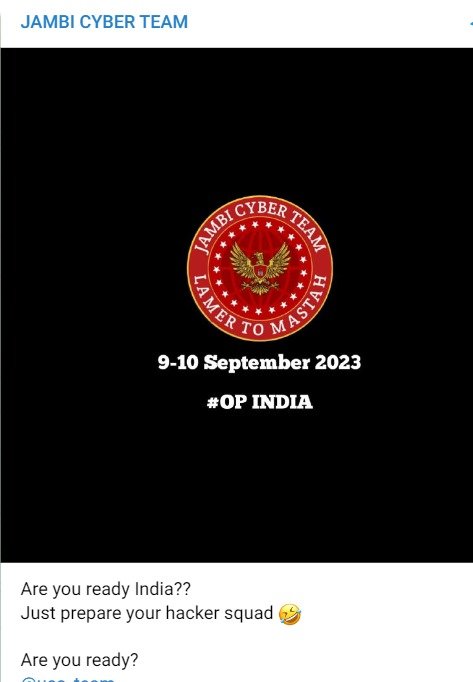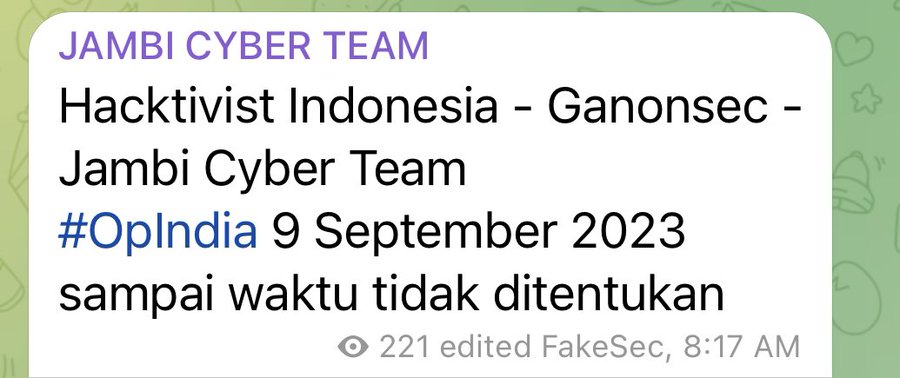In a concerning development preceding the G-20 India Summit 2023, multiple hacker groups have declared their intent to launch cyber attacks on India, uniting under the banner of #OPIndia.
This coordinated call for collective G20 cyber attacks, driven by anti-India sentiments, raises alarms as India prepares to host global leaders at the upcoming G-20 summit.
Numerous hacker collectives have designated Indian websites as their cyber attack targets. These attacks have begun impacting several Indian websites, which are linked to the G20 cyber attack claims.
One of the hacker groups, Jambi Cyber Team, has declared its intent to launch campaign OpIndia, targeting Indian websites on September 9th and 10th.
OpIndia: Anticipated G20 Cyber Attacks by Hacker Collectives

The G20 India summit 2023 which is aimed at digital transformation will be held on September 9 and 10, 2023. However, hackers have declared a cyber war against the nation.
Numerous representatives from G20 member countries, such as the United States, the United Kingdom, Germany, and Saudi Arabia, will convene to discuss urgent global matters related to peace and technological advancements.
ALSO READ| Beware of G20 Scams!
As preparations for the G20 continue, hacktivists have utilized cybercrime forums to rally hackers, urging them to focus their efforts on targeting India’s digital infrastructure.
Here are the Twitter IDs of the hackers who have been involved in the G20 cyber attacks thus far:–
- @RedNotice_id
- @ganosecteam01
- @Team_Herox
- @Hacktivist_indo
- @Dan4Indonesia
Jambi Cyber Team Cyber Attacks

Jambi Cyber Team named several Indian organizations’ websites as its target as part of OpIndia and the G20 cyber attacks. They named several hacker groups in the claim on Twitter/ X.
The authenticity of the Indian websites’ cyber attacks has not been confirmed yet. However, relying on claims made via various social media platforms used by hacktivists, the names of the following Indian websites have been gathered:
- The Unified District Information System for Education (UDISE)
- Educational Management Information System
- Sangamner College
- Shreehari
- MPSC Online
As part of the OpIndia and G20 cyber attacks, the hackers have shared samples of data they exfiltrated from multiple Indian websites. This includes the posting of registration details of individuals along with their photos on their respective social media channels.
Hackers released data pertaining to several school students. In the samples, student names, parents’ names, member IDs, and other profile data from their dashboard were posted.
They have also indicated their intention to leak more data in the future, all while making derogatory comments about the state of Indian cybersecurity infrastructure.
Indonesian hackers have joined the G20 cyber attack initiative and have been actively encouraging other hackers to target Indian websites.

The Indonesian language text posted on Telegram in the message about the G20 cyber attacks translated to ‘time not specified,’ leading to speculations about the schedule of Operation India.

The Cyber Express also found several Indian websites being targeted before the commencement of the G20 Summit, in 2023. Most of the websites showing in Google search results belonging to India had their websites defaced.
This poses the question about the G20 cybersecurity measures which need to be tightened to avoid security incidents. Amid the tense cyber war between nations, it is also imperative to take cybersecurity seriously not just by governments and organizations but also by each individual.
Exposing individuals’ data online can pose significant risks, including financial vulnerabilities and the potential for identity theft, as well as the unauthorized duplication of government-issued documents.
Media Disclaimer: This report is based on internal and external research obtained through various means. The information provided is for reference purposes only, and users bear full responsibility for their reliance on it. The Cyber Express assumes no liability for the accuracy or consequences of using this information.
